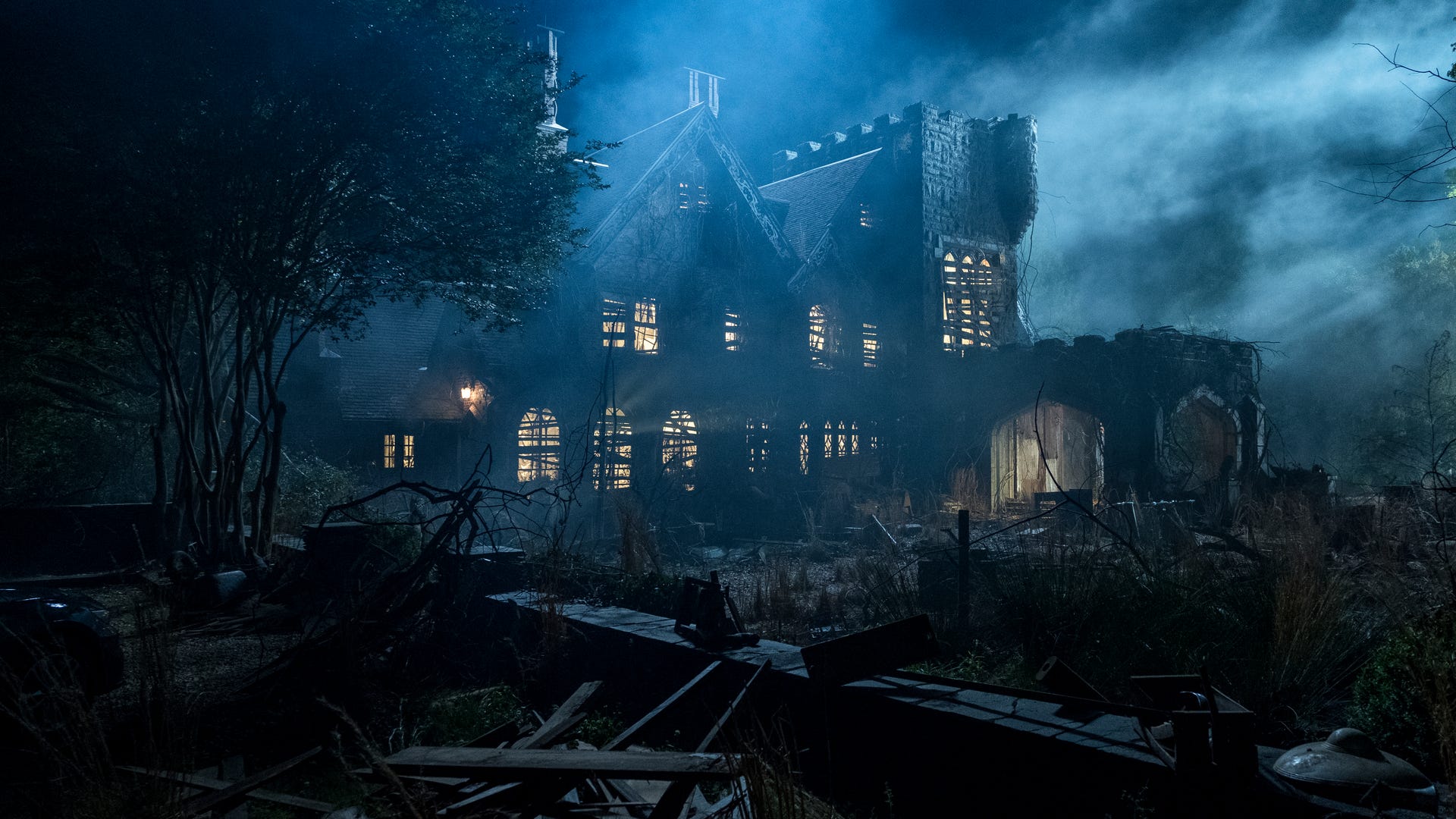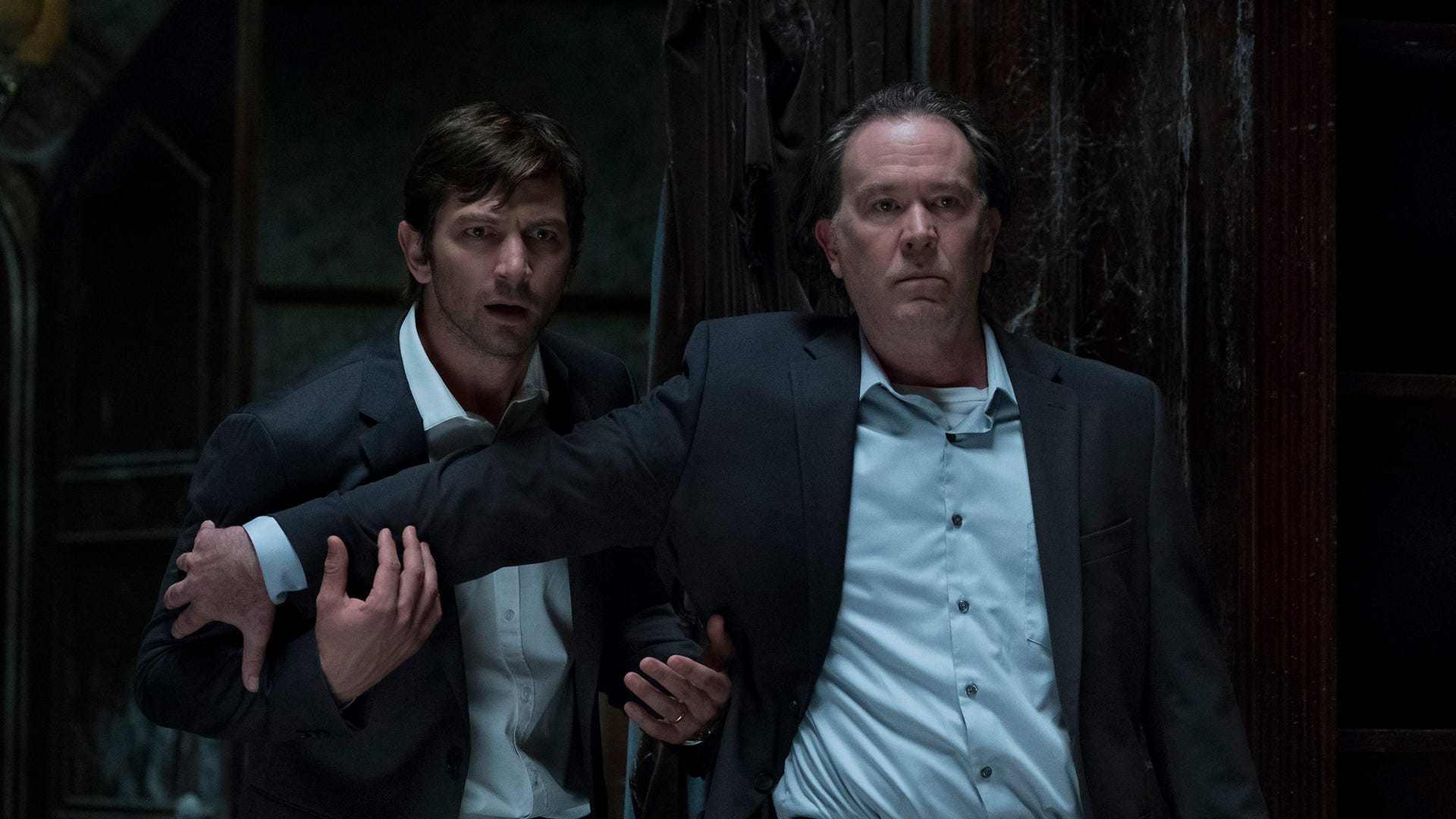Join or Sign In
Sign in to customize your TV listings
By joining TV Guide, you agree to our Terms of Use and acknowledge the data practices in our Privacy Policy.
The Haunting of Hill House Review: Netflix's Horror Series Is a Provocative Examination of Isolation and Belonging
Why it's a must-watch for horror fans
While horror films often dominate the fall box office, the genre still rarely gets its due on the small screen -- at least in any traditional sense. American Horror Story is nearly all camp now,The Walking Dead has always been more of a character drama with horror elements, and even Black Mirror only tells standalone stories rather than take full advantage of the serialized potential of the medium.
Fortunately, horror maverick Mike Flanagan (Gerald's Game, Oculus) and Netflix are here to amend that oversight with The Haunting of Hill House, a 10-episode series dropping on Friday, Oct. 12. But it's important to note that Hill House isn't an adaptation so much as it is total reimagining of Shirley Jackson's 1959 novel of the same name. It's as though Flanagan has taken Jackson's original work, shattered it and then rearranged the pieces to create a completely original, but equally brilliant tale.
While Jackson's seminal haunted house novel centers on the crushingly lonely protagonist Eleanor Vance as she abandons her reclusive life to participate in a scientific study searching for evidence of the supernatural at Hill House alongside a group of strangers, Flanagan has turned Hill House into a complex family drama told across two timelines and through which ideas surrounding the effects and significance of grief, isolation and belonging are constantly deconstructed and rebuilt anew.
Keep track of your favorite shows: Listings | iOS App | Android App
In Flanagan's reimagining, Eleanor Vance has become Nell Crain (Victoria Pedretti and Violet McGraw), still the story's most tragic figure but now the youngest girl in a large and loving (albeit, in their own way) family. Nell's joined by her twin brother Luke (Oliver Jackson-Cohen and Julian Hilliard), an impossibly scared child who attempts to suppress his fears through heroin later in life and whose psychic connection to Nell appears to cause both of them as much pain as it does comfort. There's also the eldest child Steven (Michiel Huisman and Paxton Singleton), whose misguided attempts to help the family are constantly handicapped by his refusal to accept the existence of the paranormal; the eldest daughter Shirley (Elizabeth Reaser and Lulu Wilson), whose need to demystify death has led her into a career as a funeral home director; and the middle child Theodora (Kate Siegel and Mckenna Grace), who has been blessed (or cursed) with the ability to absorb information and emotion imbued in objects and people through the touch of her hand.
Each wildly different from the other, the Crain siblings are forever bonded yet irreparably fractured by the tragic events that befell them during their childhood living at Hill House. After their parents Hugh (Timothy Hutton and Henry Thomas) and Olivia (Carla Gugino) bought the vile house to flip for a profit, a series of seemingly inexplicable phenomena began terrorizing the Crains, leading Hill House to take its first victim in the family...but not its last.

Flanagan's expert remixing of the characters and themes of Jackson's novel means that fans of the book will have the unique sensation of wading into territory that feels both completely familiar and utterly new. This contradictory juxtaposition is reflective of the central motif of Hill House's disharmony, in which a person's greatest fear and greatest desire are often one and the same, and where in order to move forward you must run toward the past.
Like Hill House itself, Mike Flanagan's direction is deliberate and unsettling. Rather than relying on jump scares for quick, but superficial thrills, Flanagan uses long, extended panning shots to put the viewers directly into a character's point of view, making you eerily aware of the limitations of an individual's perception at any given moment. As the character looks ahead of them, you can't help but tense up wondering what awaits them once the camera eventually pans behind. Sometimes nothing is revealed, but the sense of unease -- that at any moment what you fear could be lurking just out your sense of vision -- is what drives much of the series' suspense. And even after the moment of danger passes, it's a fear that lingers on, having instilled in the viewer an impermeable sense of doubt that anyone could ever truly be fully aware, or fully in control, of their circumstances.
Exposing the limitations of rationality and control is a recurring hobby of the series, often explored through the eldest Crain child, Steven, who represents the pinnacle of orthodoxy and societal status quo. Despite never having believed the ghostly stories of his family members, Steve has built his career as a writer of haunted house novels -- including one based on his childhood at Hill House. And while he constantly chases the mysteries of the paranormal, and along the way has built up a small fortune doing so, he does so in a quest to end the mysteries by reducing them to things that fit inside his prescribed box of rational understanding. Steven has no interest in validating his family's experiences, but only to create a sense of (illusionary) control over the seemingly inexplicable, to define and explain the unknown to the point where it can no longer terrify him.

But as Steven attempts to apply rational binary thinking (good/bad, true/false, real/imagined) to the events that have befallen his family, he's missing out on the much larger mystery: whether that binary exists. Boundaries and prescribed limits give humans a sense of comfort and the perception of order, which is why transgressing them can be simultaneously so thrilling yet such a source of unease. And the foundations of Hill House are built upon these very transgressions, as the hauntings from the house follow the Crains outside its claustrophobic walls, as the line between self and other is disconcertingly blurred through Theo's abilities and Luke and Nellie's bond, and even as the relationship between cause and effect gets muddled beyond distinction, like the ouroboros eating its own tail.
So is Hill House the vindictive source of the Crain family's suffering? Or have the powerful, repressed emotions of the family members spilled out into the house, manifesting into specters and scares? Based on the six episodes screened to critics, the answer doesn't appear to be one or the other, but both. Hill House is at once the source of great evil that can drive anyone mad and also a means of salvation from the suffocating confines of our world and ourselves. It is a place where simultaneous truths ram against each other like crashing waves until it becomes near-to-impossible to decipher where the house ends and the individual begins.
The opening lines of both Jackson's novel and the series state that Hill House exists "under conditions of absolute reality," and this appears to be what the Crains are confronted with across the series, and what they spend so long running away from. The house strips away the pleasant lies we tell ourselves until all that's left is a truth so staggering that maybe no one can bear to face it and maintain their sanity. But what becomes clear in Hill House again and again is that one can never escape their reality; they will merely run for so long until they accidentally come full circle, charging directly toward it and only realizing what they've done when it's already too late to change course.
The Haunting of Hill House premieres Friday, Oct. 12 on Netflix.
